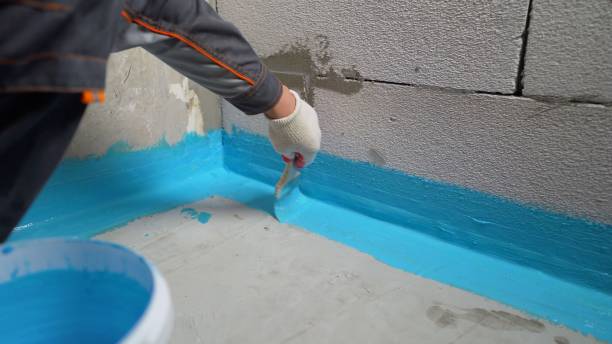
In a city like New York, where the climate can be harsh and unpredictable, ensuring proper concrete waterproofing is paramount. Whether you’re a homeowner, contractor, or property manager, it’s essential to grasp the fundamentals of concrete waterproofing to safeguard your investment and ensure the durability of your structures. Trust Eden Roofing And Waterproofing NYC to deliver top-notch services tailored to your specific requirements, ensuring peace of mind and long-term protection for your properties.
Introduction to Concrete Waterproofing
Concrete waterproofing involves applying various techniques and materials to prevent water from penetrating the surface of concrete structures. Without proper waterproofing, water can seep into the concrete, leading to a range of issues such as deterioration, mold growth, and structural damage.
Importance of Waterproofing in NYC
In a city like New York, where buildings are constantly exposed to moisture from rain, snow, and humidity, waterproofing is not just a luxury but a necessity. The extreme weather conditions and urban environment make buildings vulnerable to water damage, making waterproofing a critical preventive measure.
Types of Concrete Waterproofing
Surface Waterproofing
Surface waterproofing involves applying a protective coating or membrane directly onto the surface of concrete to create a barrier against water infiltration. This method is effective for above-grade structures such as roofs, balconies, and facades.
Integral Waterproofing
Integral waterproofing involves adding waterproofing agents directly into the concrete mix during the construction phase. This method ensures that the entire structure is inherently resistant to water penetration, providing long-term protection from moisture damage.
External Waterproofing
External waterproofing involves excavating around the foundation of a building and applying waterproofing membranes or coatings to the exterior walls below ground level. This method is commonly used for basements and below-grade structures to prevent groundwater intrusion.
Common Waterproofing Problems in NYC
Despite the importance of waterproofing, many buildings in NYC face common issues related to water damage:
Moisture Seepage
Moisture seepage occurs when water penetrates through cracks or gaps in the concrete, leading to dampness and mold growth inside the building.
Mold and Mildew Growth
Excess moisture can create a breeding ground for mold and mildew, which not only pose health risks but also cause unsightly stains and odors.
Structural Damage
Over time, water infiltration can weaken the structural integrity of concrete, leading to cracks, spalling, and even collapse in severe cases.
Factors to Consider Before Waterproofing
Before embarking on a waterproofing project, several factors should be taken into account:
Climate and Weather Conditions
New York experiences a range of weather conditions throughout the year, including heavy rainfall, snow, and temperature fluctuations. The choice of waterproofing materials and methods should be tailored to the specific climate conditions to ensure effectiveness.
Building Materials
Different types of concrete and construction materials have varying levels of susceptibility to water damage. Understanding the properties of the materials used in the building is essential for selecting the appropriate waterproofing solutions.
Location and Surroundings
The proximity to bodies of water, underground utilities, and neighboring structures can influence the risk of water infiltration. Site-specific considerations should be taken into account when designing waterproofing systems.
Steps for Effective Concrete Waterproofing
Surface Preparation
Before applying waterproofing materials, the concrete surface must be thoroughly cleaned and repaired to remove any contaminants, cracks, or imperfections.
Choosing the Right Waterproofing Material
There are various types of waterproofing materials available, including liquid-applied membranes, sheet membranes, and cementitious coatings. The selection should be based on factors such as substrate type, exposure conditions, and durability requirements.
Application Techniques
Proper application techniques are critical for ensuring the effectiveness and durability of waterproofing systems. Following manufacturer guidelines and industry best practices is essential to achieve optimal results.
Quality Assurance
Regular inspections and maintenance are necessary to identify any issues or deficiencies in the waterproofing system and address them promptly to prevent water damage.
Benefits of Professional Waterproofing Services
While some property owners may attempt DIY waterproofing projects, hiring a professional waterproofing contractor like Eden Roofing And Waterproofing NYC offers several advantages:
- Expertise and Experience: Professional contractors have the knowledge and experience to assess waterproofing needs accurately and recommend appropriate solutions.
- Quality Assurance: Professional waterproofing companies provide warranties and guarantees for their workmanship, giving property owners peace of mind.
- Time and Cost Savings: DIY waterproofing projects can be time-consuming and costly, especially if mistakes are made. Hiring professionals ensures efficient and cost-effective solutions.
Conclusion
Concrete waterproofing is a vital investment for protecting buildings in NYC from water damage and ensuring their long-term durability. By understanding the different types of waterproofing methods, factors to consider, and maintenance tips, property owners can safeguard their structures against the harsh elements of the city. Eden Roofing And Waterproofing NYC is dedicated to providing comprehensive solutions for all your construction needs.






